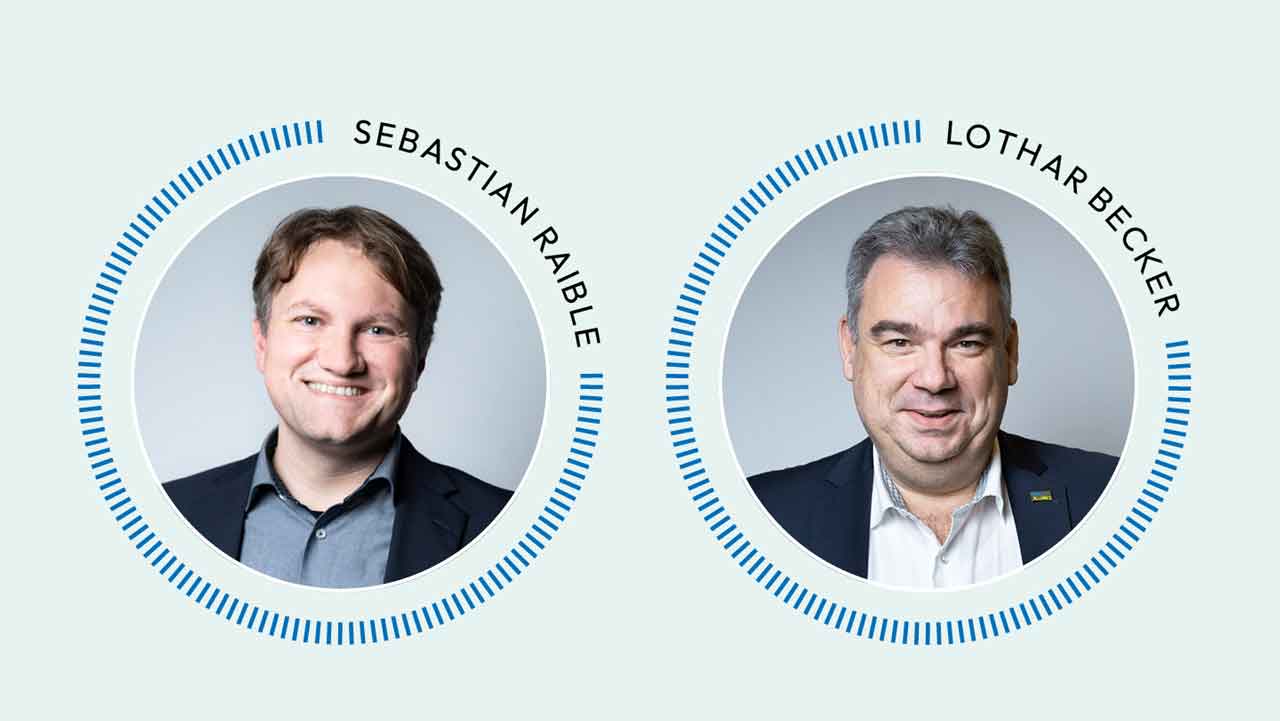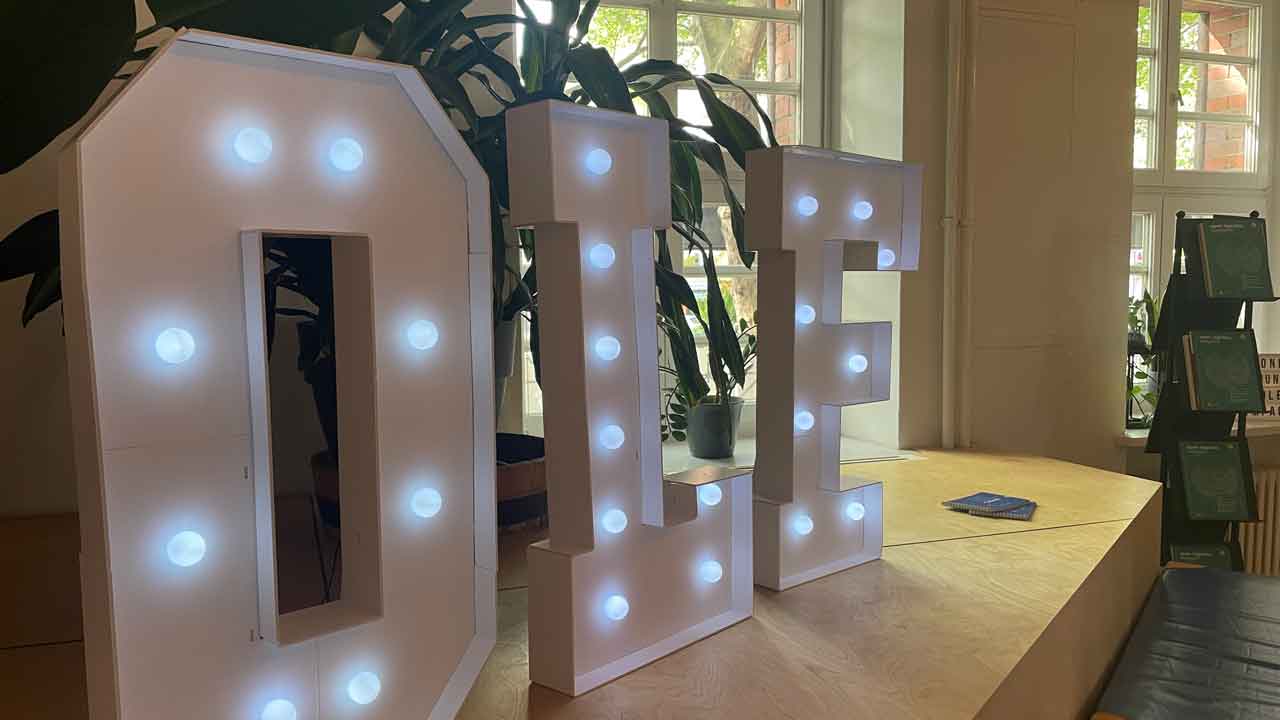According to the International Transport Forum, demand for freight transport is expected to almost triple by 2050. Freight transport and logistics already account for eight to ten per cent of global greenhouse gas emissions. Even before the Paris Climate Agreement of 2015, which aims to limit global warming to well below two degrees Celsius and preferably 1.5 degrees Celsius, logistics companies have increasingly committed themselves to reducing their CO2 emissions and promoting sustainability. “We all want to become greener”, says Justin Lemmens, Manager for Safety, Health, Environment and Quality (SHEQ) at LKW WALTER, summarising the mood in the industry. “We’ve been talking about sustainability in logistics for years. But now, in the last few months, it´s really becoming concrete. You can feel that the industry as a whole – finally – wants to take a step forward.” With the establishment of the Working Group “Enabling Logistics Decarbonisation” in August of this year, the members of the Open Logistics Foundation, including LKW WALTER, have now also set an example for more sustainability in the industry (see interview with Andreas Nettsträter, CEO of the Open Logistics Foundation).
Sustainability with tradition
LKW WALTER, one of the leading transport organisations in European full truckload transport, has a long tradition of reducing emissions. As early as the 1950s, it was standard practice at the Austrian company to schedule vehicles exclusively “on a round trip” – avoiding empty runs. In 1984, LKW WALTER began shifting transport from road to rail to reduce pollutant emissions. A comprehensive environmental management system was developed in the 1990s. External environmental audits have recognised the company’s environmental activities as exemplary in the transport sector. Justin Lemmens: “Emissions reporting is now an important factor in tenders for logistics services. Customers are increasingly making it mandatory.”
From the top down
However, regulatory measures have also increased in recent years: With Directive 2022/2464 of the European Parliament and Council – the so-called “Corporate Sustainability Reporting Directive”, or CSRD for short – from December 2022, the European Commission has already obliged companies to publish and externally verify information on the sustainability of their business activities. On paper, the measures only affect so-called public interest entities (PIEs). These “public interest entities” included listed companies in particular, as well as credit institutions and insurance companies. From next year, the directive will be applied to large PIE companies with a net turnover of more than 50 million euros, for example, and from 2026, also to medium and small PIE companies.
However, because PIE companies must prove that sustainable standards are followed throughout their entire value chain, the CSRD also extends to all other companies. Justin Lemmens expects that “the directive will quickly cover most of the market, certainly 90 per cent. So, what was optional yesterday will become mandatory tomorrow. That’s why we at the Open Logistics Foundation are currently working on a standard for data exchange in the context of sustainability reporting.”
EMISSSIONS IN LOGISTRICS ARE INCREASING, BUT SOLUTIONS ARE IN REACH. NOW, WE NEED TO BRING TOGETHER THE RIGHT PARTNERS.
Rik Arends, Smart Freight Centre
“Solutions are within reach“
Smart Freight Centre (SFC) is an important partner in this process: the non-profit organisation based in Amsterdam has been working since 2013 to improve the efficiency of freight transport and reduce transport-related emissions through a wide range of projects at various levels around the world. “Emissions in logistics are increasing, but solutions are within reach: manufacturers in – our wording: shippers – freight forwarders and carriers play a central role in this,” says Rik Arends, Director Sustainable Freight Buyer Alliance of Smart Freight Centre. “Now, we need to bring together the right partners based on our activities, deliver high-quality analyses and operate successful integrated project management. Transparency and trust are crucial here.“ SFC recently became a network partner of the Open Logistics Foundation. Thus, the two organisations form an alliance in the field of zero-emission logistics, to which SFC contributes its sustainability expertise and the Foundation, the perspective of the logistics industry.
With the GLEC programme, short for Global Logistics Emissions Council (GLEC), Smart Freight Centre began to promote a broad, transparent and consistent calculation and reporting of logistics greenhouse gas emissions in 2015. The GLEC framework was the first globally recognised methodology for calculating emissions in logistics according to the Greenhouse Gas Protocol (GHG). The industry guideline offers multinational companies and their suppliers a harmonised, efficient and transparent way of calculating and reporting logistics emissions. It quickly became a common industry guideline. “LKW WALTER has been collecting its data according to the GLEC since 2019, and of course, many others in the industry are doing the same,” says SHEQ Manager Justin Lemmens.
The ISO 14083 standard “Greenhouse gases- Quantification and reporting of greenhouse gas emissions arising from transport chain operations” is now based on the principles and methodology of GLEC. Published in March 2023, less than two years later, the standard has been widely accepted in the corporate landscape and is on its way to becoming a global standard. Justin Lemmens: “ISO 14083 is already established in the EU: There is no way around it for companies in Europe!”
The iLEAP project will produce a data model extension, which builds on and extends the Product Carbon Footprint Data Model developed by the World Business Council for Sustainable Development. Read the technical specifications.
Containing uncontrolled growth
However, collecting data is one thing, exchanging data is another: “The path to decarbonisation is not a predefined path, which is why decarbonisation is so complex,” explains Violetta Matzoros, Technical Manager at Smart Freight Centre. For the next step after the successful application of the GLEC framework and the associated ISO standard, Smart Freight Centre launched the iLEAP project, short for Integrating Logistics Emissions and PCFs, together with the SINE Foundation in 2023. In the project, SFC seeks to “overcome the challenges of data exchange” together with companies, as Violetta Matzoros says: “The more comparable data we make available and then analyse, the closer we get to reporting real values – and our goal of zero-emission logistics by 2050 at the latest.”
LKW WALTER has been involved in iLEAP right from the start. In the project, which will run until the beginning of next year, the members first determined the form in which transport data should be recorded so that it can be compared. Because: “There are actually thousands of ways to exchange the data. However, if everyone did it the way they wanted, this would lead to a lack of transparency and prevent comparability,” says Justin Lemmens. “That’s why in iLEAP, we looked at the question of the units in which the values specified by GLEC and the ISO standard should be recorded and digitised.”
While clarifying these questions, the group has already developed a data model specification, which is published as open source on GitHub, and can be used as a basis for a standard API Interface. This work is driven by the software engineers of the SINE Foundation. Justin Lemmens: “We have presented a technical solution that is as simple as possible. If every transport company uses this API, we will all make our lives easier!”
EMISSIONS REPORTING IS A CLASSIC COMMODITY: AS A LOGISTICS SERVICE PROVIDER, WE CANNOT DIFFERENTIATE OURSELVES.
Justin Lemmens, LKW WALTER
A leap into practice
However, one question remained unanswered at first: How will the interface find the necessary distribution? Violetta Matzoros from Smart Freight Centre: “In our experience, manufacturers – in our language: shippers – are generally more willing to decarbonise transport. On the one hand, they are subject to more regulatory requirements than many of the logistics companies. On the other hand, their customers – the end consumers – demand sustainable products, especially when it comes to consumer goods. However, this does not mean logistics service providers are not committed to decarbonisation.”
On the contrary: in the iLEAP project in particular, logistics has become the number one driver of sustainable logistics. “We logisticians know our data best and know how to handle it: That’s why it makes sense for us to be particularly active here,” explains Justin Lemmens from LKW WALTER. “What we want to offer our customers, the manufacturers and shippers, are not abstract values but real levers that they can use to make their products more sustainable. We aim to start a dialogue about how transport can become greener – and this idea unites us all!”
Software companies, in particular, strongly support the implementation of iLEAP: “Many manufacturers will outsource the calculation of emissions and creation of emissions reports to software providers. For them, interoperability is the key to a new business model,” observes Violetta Matzoros.
With the publication “Treibhausgasemissionen im Transportsektor” (“Greenhouse gas emissions in the transport sector”), the Umweltbundesamt, the central environmental protection agency of Germany and the Federal Ass. For Freight Forwarding and Logistics Germany (DSLV), provide an up-to-date guide to ISO 10483. 68 pages, March 2024. Download the publication!
Promising use cases
Logistics service providers are now taking the lead in spreading the iLEAP interface to gain allies and supporters – with and within the Open Logistics Foundation. As part of the Foundation’s new Working Group “Enabling Logistics Decarbonisation”, they have launched the Project “Emissions Reporting” (see info below). The aim is to carry out several identical use cases with different partners this year in order to see how the component can be integrated into the IT landscapes of different companies and which specifications make sense. By testing the data model, companies can also validate business models: Does the interface create more transparency than in the past – and how will my company be supported in decarbonisation? In addition to the actual component, the corresponding reference implementation will be available in the Open Logistics Foundation Repository.
“Many companies can only be convinced by tangible results. That’s why we support the Working Group as an associated partner,” says Rik Arends from Smart Freight Centre. Violetta Matzoros adds: “In recent weeks, we have already been able to convince several shippers to test the iLEAP interface. This is certainly due to the fact that the results of our project are spreading. But also because the collaboration with the Open Logistics Foundation is propagating our reach.” Or, as Justin Lemmens from LKW WALTER puts it: “The Open Logistics Foundation offers a great environment for making the iLEAP interface the standard. This is exactly the rocket fuel we need right now!”
“THE WORKING GROUP IS WHAT LEADING BY EXAMPLE LOOKS LIKE. IT IS TIME FOR MORE MEMBERS TO JOIN THE COMMUNITY & STEP UP THEIR EFFORTS TO MATERIALISE SEAMLESS EMISSIONS DATA EXCHANGE.”
Violetta Matzoros, Smart Freight Centre
EMISSIONS REPORTING
As part of the project, the iLEAP data model developed by Smart Freight Centre and the SINE Foundation for exchanging sustainability data along the supply chain will be validated in various use cases.
Project details
Project start: August 2024
Working Group: Enabling Logistics Decarbonisation
Members
LKW WALTER (Lead), BLG, Cargo Sign, Contargo, Dachser, DB Schenker, DHL, Fraunhofer IML, iteratec, Rhenus, Transporeon, Zufall; associated partner: Smart Freight Centre (Project iLEAP, a joint project of Smart Freight Centre and the SINE Foundation)
Project lead
Justin Lemmens, LKW WALTER
In 2022, 78 per cent of freight transport in the European Union was handled by road. Rail accounted for 17 per cent and inland waterway transport for five per cent..
Source: Federal Statistical Office of Germany
This article was published in the fourth edition of the Open Logistics Magazine. You can read the full magazine and register for future editions here.





